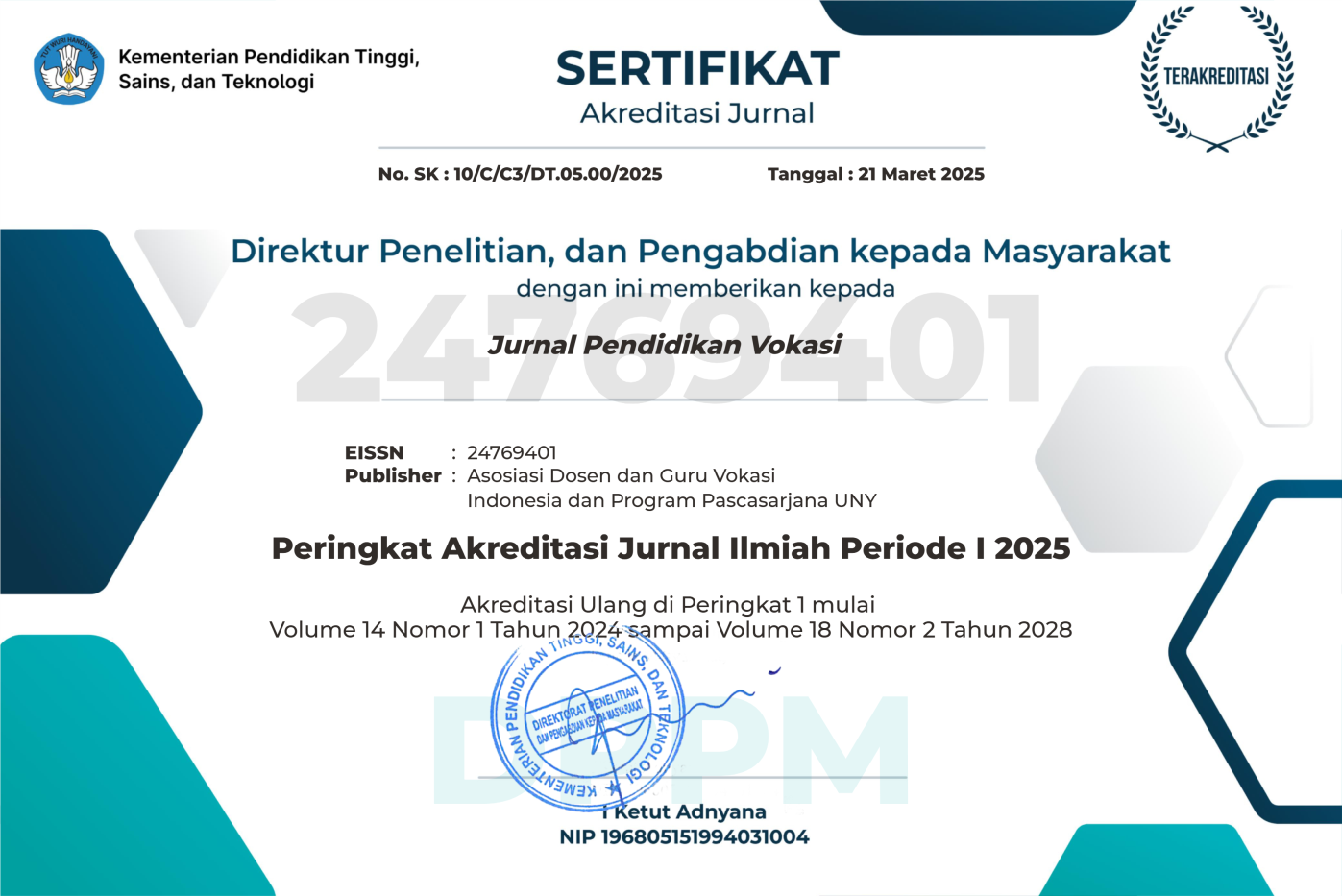Mapping professional competency for teachers' productive arts and culture of vocational school
DOI:
https://doi.org/10.21831/jpv.v12i1.44830Keywords:
Productive teachers, professional competence, vocational schoolAbstract
References
Arifin, M. A., Rasdi, R. M., Ashraff, M., Anuar, M., & Omar, M. K. (2017). Competencies of vocational teacher: A personnel measurement framework. International Journal of Academic Research in Business and Social Sciences, 7(Special Issue), 147–164. https://doi.org/10.6007/IJARBSS/v7-i14/3659
Ariyanto, R. H. M., & Haq, M. S. (2019). Upaya peningkatan kompetensi profesional guru di SMK Negeri 1 Surabaya. Inspirasi Manajemen Pendidikan, 7(3), 1–11. https://jurnalmahasiswa.unesa.ac.id/index.php/37/article/view/29333
Cahyono, S. M., Kartawagiran, B., & Mahmudah, F. N. (2021). Construct exploration of teacher readiness as an assessor of vocational high school competency test. European Journal of Educational Research, 10(3), 1471–1485. https://doi.org/10.12973/eu-jer.10.3.1471
Darmi, D. (2015). Kompetensi guru produktif dalam meningkatkan sikap kewirausahaan siswa pada SMK Negeri 3 Banda Aceh. Jurnal Administrasi Pendidikan, 3(1), 33–45. https://www.neliti.com/publications/94110/kompetensi-guru-produktif-dalam-meningkatkan-sikap-kewirausahaan-siswa-pada-smk
Hartiningtyas, L. P., & Elmunsyah, H. (2016). Meningkatkan kompetensi pedagogik dan profesional guru smk melalui pemberdayaan Pengembangan Keprofesian Berkelanjutan (PKB). Prosiding SNP (Seminar Nasional Pendidikan) Prodi Pendidikan Akuntansi FKIP Universitas Muhammadiyah Surakarta, 79–88. http://hdl.handle.net/11617/7273
Juliarti, A. I., Darmawang, D., & Purnamawati, P. (2018). Analisis kinerja guru SMK yang sudah tersertifikasi di Kabupaten Sinjai [Universitas Negeri Makassar]. http://eprints.unm.ac.id/id/eprint/11680
Kementerian Pendidikan Nasional Republik Indonesia. (2007). Peraturan Menteri Pendidikan Nasional Republik Indonesia Nomor 16 Tahun 2007 tentang Standar Kualifikasi Akademik dan Kompetensi Guru dengan Rahmat Tuhan Yang Maha Esa Menteri Pendidikan Nasional. Kementerian Pendidikan Nasional Republik Indonesia. https://sumsel.bpk.go.id/files/2009/10/PERMEN2.PDF
Kramarski, B., & Michalsky, T. (2009). Investigating preservice teachers' professional growth in self-regulated learning environments. Journal of Educational Psychology, 101(1), 161–175. https://doi.org/10.1037/a0013101
Mahmudah, F. N., & Putra, E. C. S. (2020). What makes employees productive and have high performance? human capital investment in universities. Asian Journal of Education and Social Studies, 11(1), 21–36. https://doi.org/10.9734/AJESS/2020/v11i130281
Matondang, Z. (2010). Kompetensi profesional guru SMK bidang keahlian teknik bangunan di Medan. Jurnal Pendidikan Dan Kebudayaan, 16(6), 638–647. https://doi.org/10.24832/jpnk.v16i6.492
Mulyadi, Y., Sucita, T., & Purnama, W. (2019). Mapping competencies of vocational teachers in the industrial era 4.0. Proceedings of the 5th UPI International Conference on Technical and Vocational Education and Training (ICTVET 2018), 368–372. https://doi.org/10.2991/ictvet-18.2019.83
Setiawan, A. H. (2015). The contribution of the vocational teachers' professional competence toward vocational high schools' performance. Proceedings of the 3rd UPI International Conference on Technical and Vocational Education and Training, 1–6. https://doi.org/10.2991/ictvet-14.2015.1
Sudana, I. M., Raharjo, D. W., & Supraptono, E. (2015). Soft skills competence development of vocational teacher candidates. Jurnal Penelitian Pendidikan, 32(1), 19–24. https://doi.org/10.15294/jpp.v32i1.5703
Sumaryanta, S., Mardapi, D., Sugiman, S., & Herawan, T. (2018). Assessing teacher competence and its follow-up to support professional development sustainability. Journal of Teacher Education for Sustainability, 20(1), 106–123. https://doi.org/10.2478/jtes-2018-0007
Susatya, E., Santosa, B., Andriyani, A., & Ariyani, D. (2021). Evaluating the implementation of the character education strengthening program of vocational high schools in Yogyakarta City. REID (Research and Evaluation in Education), 7(1), 23–34. https://doi.org/10.21831/reid.v7i1.38029
Wagiran, W., Pardjono, P., Suyanto, W., Sofyan, H., Soenarto, S., & Yudantoko, A. (2019). Competencies of future vocational teachers: Perspective of in-service teachers and educational experts. Cakrawala Pendidikan, 38(2), 387–397. https://doi.org/10.21831/cp.v38i2.25393
Wardoyo, C., Satrio, Y. D., & Ratnasari, D. A. (2020). An analysis of teachers' pedagogical and professional competencies in the 2013 Curriculum with the 2017-2018 revision in accounting subject. REID (Research and Evaluation in Education), 6(2), 142–149. https://doi.org/10.21831/reid.v6i2.35207
Wheeler, L., Guevara, J. R., & Smith, J.-A. (2018). School–community learning partnerships for sustainability: Recommended best practice and reality. International Review of Education, 64(3), 313–337. https://doi.org/10.1007/s11159-018-9717-y
Downloads
Published
How to Cite
Issue
Section
Citation Check
License
The authors submitting a manuscript to this journal agree that, if accepted for publication, copyright publishing of the submission shall be assigned to Jurnal Pendidikan Vokasi. However, even though the journal asks for a copyright transfer, the authors retain (or are granted back) significant scholarly rights.
The copyright transfer agreement form can be downloaded here: [JPV Copyright Transfer Agreement Form]
The copyright form should be signed originally and sent to the Editorial Office through email to jpvokasi@uny.ac.id
Jurnal Pendidikan Vokasi by http://journal.uny.ac.id/index.php/jpv is licensed under a Creative Commons Attribution-ShareAlike 4.0 International License.













